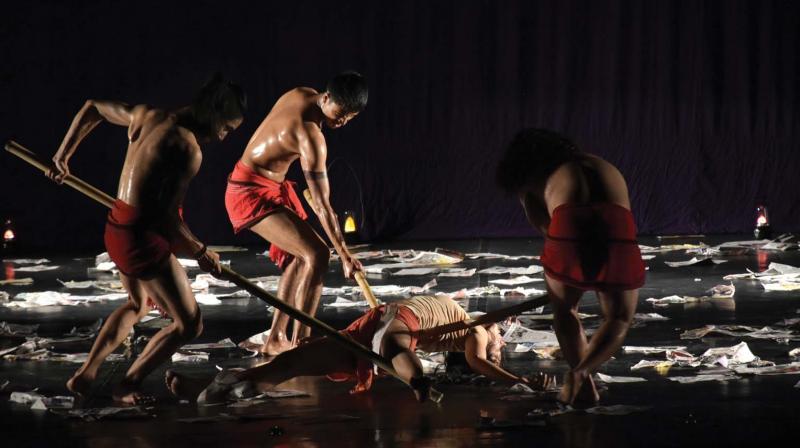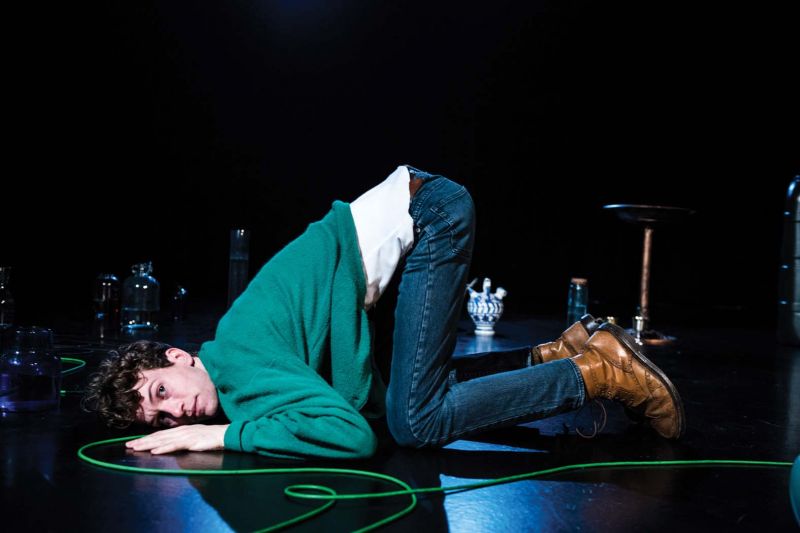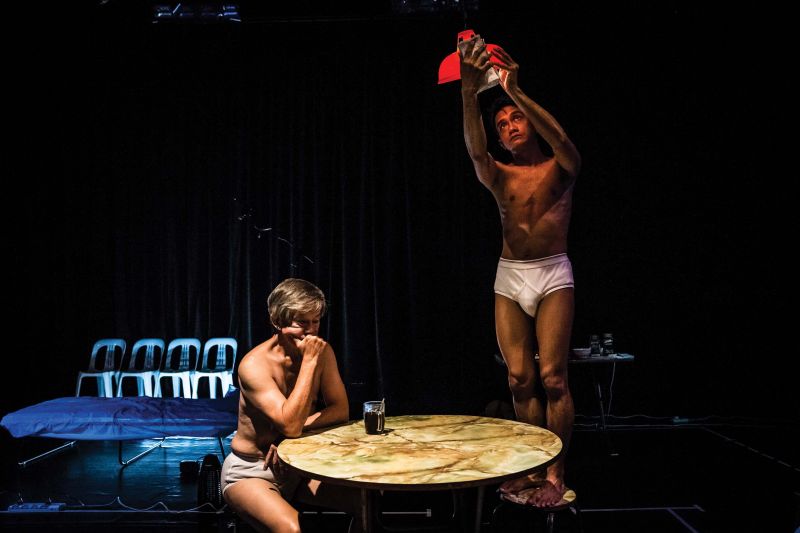Theatre fest gets under way
The 10th annual ITFoK, Thrissur, focuses on Reclaiming the margins'; Ammannur award for Karnad.

What better arena than the cultural capital of Thrissur to host the annual theatre extravaganza- ITFoK 2018- the International Theatre Festival of Kerala The conferring of State Government's Ammannur Puraskaram, instituted in memory of Koodiyattam exponent Ammannur Madhava Chakyar, on thespian theatre director and playwright Girish Karnad will be a highlight of the ongoing festival at Kerala Sangeetha Nataka Akademi. The award will be conferred during a programme to be held on the 26th of this month. The fest focuses on 'Reclaiming the Margins'. 16 international groups/p-erformers vie for excellence. There are 12 national plays and 5 in Malayalam. Traditional art forms such Kanyar Kali, Kolkkali, Duffmuttu (for the first time) by women, Paliya Nritham, Sufiyana, poetry session and fusion music regale audiences at various halls and School of Drama in Thrissur.
A play created by 16 transgender persons through a workshop led by Chennai director Sreejith Somasundaram is a high watermark. Academics and theatre practitioners chair seminars on five different topics that deal with theatre. The festival directorate comprises theatre personalities M.K. Raina, S. Sunil and Rajiv Krishnan, who curated the plays. "Through this festival, we hope to highlight the power of the margins as a space for collective reflection, engagement and action: a place where silences are broken, old languages revived, new ones forged, and, a space to make the invisible, visible", says their concept note.
 My Body Welsh (Alex Harvey-Brown, Savannah)
My Body Welsh (Alex Harvey-Brown, Savannah)
Mangai, Reghoothaman and Kumaravarma are on the festival advisor group. Mangai's says, "Theatre of the margin is not begging to be included by the mainstream. It is challenging the centre to rethink its own grammar. Aesthetic yardsticks that are finetuned by centuries of authority must take stock of its own practices critically. Above all it also questions the process of theatre-making. It demands a level field to play an equitable game."
International directors come from a wide diversity of terrain and attitude. 'Palestine, Year Zero', from Palestine is significant in that its director Einath Weizman, from Israel, shows the havoc wrought by Israel on Palestine. She declares that she doesn't represent Israel in this play against the Nakba Law enacted by Israel. Similarly, the play 'Manus' from Iran deals with Iranian refugees imprisoned by Australian authorities on an island prison by that name. 'My Body Welsh', directed by Tara Robinson and performed by Steffan Donnelly, deals with the isolation of the Welsh language by English. 'Greeman' is a performance by Adrian Schvarzstein about how strangers are confronted by the mainstream.
 The Greenman
The Greenman
'Bad City' and 'Silence' are plays by Polish director Pawel Zokotak. The first one is about political unrest in Poland in early 19thcentury and the second, about a city occupied by refugees from Syria on siege. 'Borderline' from UK, directed by Sophie Besse, narrates the story of seven refugees from Sudan, Syria and Afghanistan, trapped in the Calais Jungle. 'Mundo Mozart', from Chile, directed by Manuel Loyola Faundez, explores how among siblings the creative genius of the daughter is suppressed. The second Iranian play, 'Voicelessness', directed by Azade Shamiri, is about an enquiry being made by a young woman in 2070 about the disappearance of her grandpa.
 The Malayman and his Chinese father (Shawn B Danker)
The Malayman and his Chinese father (Shawn B Danker)
Synopsis: A young Iranian woman, living in the year 2070, wants to discover the truth and finally understand why her grandfather disappeared under suspicious circumstances. She starts to dig into the past looking for hints and proof in order to comprehend what happened back then in Iran. But there is nothing. Lacking hard evidence, she selectively creates a story based on video footage and old recordings and in this way attempts to banish the omnipresence of the past. But in the dystopian society that the world has become, in which freedom of expression is stifled, who will admit what really happened? 'Walk South Africa', directed by Sara Machette, bases it on the incident of teen girl Anene Booysen, gang-raped and killed in South Africa. Her second play 'Womb of Fire' examines the role of two women in the birth of South Africa.
'The Malay Man and His Chinese Father' from Singapore, directed by Noor Effendy Ibrahim, depicts the lives of people isolated with races. 'Still in Paradise' from Switzerland/Egypt, conceived and performed by Yan Duyvendak and Omar Ghayatt, speaks of two types of paradises; what exists in the world created by unbridled capitalism and the second, the after-death paradise of which Islamic fundamentalists speak. 'Zig Zig,' another Egyptian play, directed by Laila Soliman, is a dramatic examination of historically recorded cases of rape and assault in Egypt by a group of colonizing British soldiers. 'The Power of Lullaby' shows a kidnapped girl, who forgets her Georgian language till she hears her mother's lullaby again. 'Love and Life' from Sri Lanka, directed by Samarakkodi, celebrates filial affection. The play dons 'Kolam' masks.
Of the 12 national plays, Akshayambara by Sharanya Ramprakash from Bengaluru, unravels the female representation in a male-dominated art form like Yakshagana. 'Man of the Heart', directed by Suman Mukhopadhyay, brings forth the life of Lalon Shah Phokir, a Bengali Sufi master and 19th century singer. 'Walk' by Maya Krishna Rao from Delhi is a reaction to the rape and murder of Nirbhaya in Delhi in 2012. 'Khol Do', again by Maya, is a depiction of a story by Sadat Hasan Manto. Surjit Nongmeikapam's 'Nerves' bares the current political turmoil in Manipur. 'Nidravathwam' by Nimmy Raphel from Pondicherry is a humorous portrayal of Kumbhakarna and Lakshmana in a reversal of boons. 'Notes on Chai' by Jyoti Dogra from Mumbai is a highly experimental piece, trying to make sense of conversations of daily life creating an opposite effect when they are placed in the background of abstract sounds. 'Queen-size' by Mandeep Raikhy from Delhi depicts in dance the love and physical intimacy between two men. 'Say, What?' by Avantika Bahl from Mumbai is a choreographed interaction between two people who slide between using and abandoning codified language.
Three plays fall into the 'socially committed' category. 'Red Light (Lal Bathi) Express' is an open interactive performance by 14 daughters of professional sex workers in Mumbai. Two autobiographical plays are 'Samajswasthya', directed by Atul Pethe from Pune, depicting the life of Prof R.D.Karve, and 'Outcaste' by Randhir Kumar from Patna. It is a visual depiction of Sharan KumarLimbale's autobiography 'Akkarmashi.' It portrays how caste discrimination destroys the cohesiveness of civilization.
Five Malayalam plays at the festival are 'Marana Match' by Sharath Revathi, 'Transformation' by Vinod.V.Narayanan, 'Uratti' by Manoj Kana, 'Randu Muri, Adukkala, Thinna' by K.R.Remesh and 'Ekantham' by Sreejith Ramanan. ITFoK 2018 is the 10th edition of the series, started in 2008 by the late Bharat Murali, who had the vision to think up such a massive project. No other state Akademi has undertaken such a huge effort and carried it through consistently. As Murali had said, ""there is hope and scope for a common platform to share and understand the life and times of our brothers (beyond the borders.) These were the thoughts that flashed across my mind as I dreamed about the historic endeavour of an international theatre festival." His dream keeps growing.
(The author is a poet and translator)

